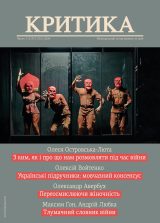Mykola Riabchuk
is a Ukrainian author and journalist. His latest books (in English) are At the Fence of Metternich’s Garden. Essays on Europe, Ukraine, and Europeanization (Stuttgart: ibidem Verlag, 2021), and Eastern Europe since 1989: Between the Loosened Authoritarianism and Unconsolidated Democracy (Warsaw: Center for East European Studies, 2020).
Articles
To prevent the escalation of violence
Statement of the Ukrainian Centre of the International PEN Club
After the Ukranian government rubber-stamped a series of repressive laws last week and further violence, the Ukrainian Centre of the International PEN Club releases a statement calling for support for Ukrainian writers and journalists, and solidarity with the Ukrainian people.
Euromaidan and beyond
Preliminary conclusions
Euromaidan is not just about failing to sign the Association Agreement, but Ukraine’s whole development as a country. For 22 years, it has been stuck in a grey zone between post-Soviet autocracies to the east and increasingly democratizing and prosperous neighbours to the west, writes Mykola Riabchuk.
The EU shouldn’t be surprised by the Tymoshenko verdict: its support of anything nominally reformist has been perceived as acceptance of a range of repressions. Tough measures are now needed if another authoritarian regime is to be prevented from forming on the EU’s eastern border, writes Mykola Riabchuk.
Ukrainian democracy is allegedly back to square one after Viktor Yanukovych’s election victory. Though reform will not take place as long as political infighting continues, Yanukovych is equally unlikely to drop the European rhetoric and defer to Moscow, writes Mykola Riabchuk. Ukraine’s leadership will continue to “muddle through” – for the time being.
Even if the West undertakes no obligations vis-à-vis the Rest, the principles upon which it is built suggest some responsibility, writes Mykola Riabchuk. Ukrainians are particularly wary of the Realpolitik that dominates western dealings with Russia. Whatever one thinks about the “centuries old affinity” between Ukraine and Russia, any policy that downplays the issue of values is fundamentally flawed.
Russia and Ukraine have come to terms over gas supplies, but the agreement will not bring a viable long-term solution, writes Mykola Riabchuk. It runs against the political and economic interests of the Russian elite, whose pressure Ukraine lacks the capacity to withstand. The EU, meanwhile, is reluctant to play the role of strong arbiter and to help those Ukrainians who would like to introduce transparency to a criminalized energy trade.
Pluralism by default
Ukraine and the law of communicating vessels
Ukraine’s pro-western government coalition has collapsed after only one year. Viktor Yushchenko’s victory in the elections in September 2007, called after the pro-Russian “parliamentary coup”, represented an opportunity for the gradual improvement of democratic institutions, writes Mykola Riabchuk. The latest crisis is yet another symptom of the political “pluralism by default” that undermines Ukraine’s long-term democratic consolidation.
The moral repugnance felt by the West towards the Lukashenko regime in Belarus is not matched by policy ideas. Civil society in the West should stop tolerating cynical realpolitik and put pressure on their governments to blacklist offending officials, says Ukrainian analyst Mykola Riabchuk. As the example of Yugoslavia shows, more sticks for the government and more carrots for the nascent civil society could well bring about positive results.
Ukraine’s “Orange Revolution” directed the world’s attention to a nation formally brushed off as a Russian satellite state. The international press portrayed Victor Yushchenko’s democratic challenge to the fraudulently elected Victor Yanukovych as the birth of Ukrainian independence. But though there’s no doubt that Ukrainian civil society has come of age, is the independence movement as young as all that? Mykola Riabchuk gives a historical overview of Ukrainian relations with Russia, and argues that talk of an East-West divide along pro- and anti-Russian lines simplifies the reality of a culturally and ideologically eclectic nation.
Political ambivalence as a socio-political phenomenon characterizes virtually every post-communist country but especially the Ukraine. Here, the country’s regional, cultural and linguistic discrepancies and the atomizing impact of Soviet totalitarianism on Ukrainian society serve to explain the deep socio-political rifts within. Mykola Riabchuk argues that the post-Soviet elite currently in power cunningly uses this situation for its political survival. Will the Ukraine be able to overcome this ambivalence and usher into an era of more democratic plurality and subsequent unity?
In his analysis of the Ukrainian media landscape and its preconditions, Mykola Ryabchuk maintains that “a situation, when people have plenty of rights on paper but cannot employ them in reality has largely persisted in the post-Soviet space. The only substantial difference between the post-Soviet states and the Soviet Union is that the latter had had a compulsory ideology”. Rather than painting a negative or positive future in conclusion, he reminds that there is a future yet to be shaped.

